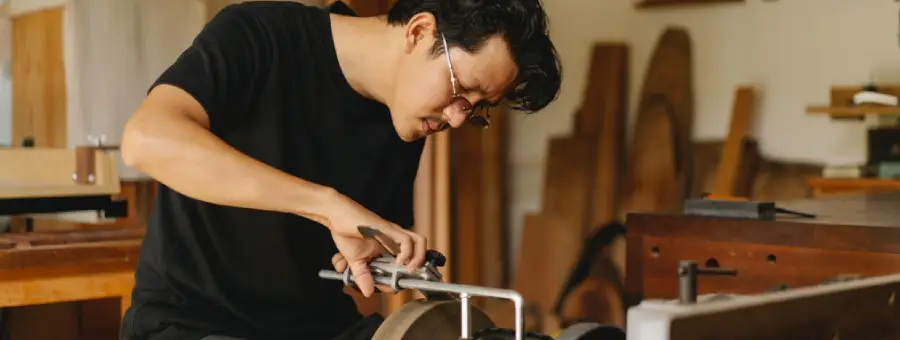
Creating the organisation of tomorrow is everyone’s opportunity. And creating it now, before competitors.
Let’s be critical first though. Few organizations will do this because they simply don’t try. Most of their effort goes into keeping up with competitors … being busy, getting through the work. Sometimes they don’t even realise that’s what they’re re doing … because of that ‘busy ness’ or because they are just proud of what they have ‘built’ to date. That represents a fundamental failing on the part of those at the top … harsh but true.
Get Creating
To create the organisation of tomorrow is not merely about gazing into the future to see what it might look like; it’s about creating some of it yourself, changing the natural path of the future. If it were so basic as to just identify trends, extrapolate them out and match what you see, then many organizations would be heading to the same place and whilst that might, logically, be regarded as an organisation of tomorrow, it’s not THE organisation of tomorrow, the one that wins, the one that stands out. Creating the organisation of tomorrow is about reducing competition and being better than them. (For those organisations that are not in a competitive environment, such as some Associations, then surely it’s still more about becoming the best they can be and not just the end result of where things are currently heading). So, whilst trends and predictions are important, the most outstanding organizations are built on shaping the future, not just predicting it and going along.
Risk
I heard it said recently that the top 20% of the world’s businesses are ‘game changers’. That makes so much sense to me …. that’s (partly or even predominantly) how they got there. They’ve looked at the future and altered it … Apple, Virgin, McDonald’s. And the moment they stop doing that, they fall behind. Game changing alters the paradigms of the arena of operation, rather than working within them … where a paradigm is a particular (thought) pattern or model. Any organization that plays within today’s paradigms automatically has competitors and significantly so. An organization that has the foresight and courage to alter paradigms is more likely to be tomorrow’s success. But this involves risk, of course it does .. that’s inherent in the world of business, sport, etc. It’s really amazing that so many business owners take a very big risk when they buy a business or start one up, and then set about taking fewer and fewer risks as years go by, which leaves their organisations fundamentally the same along the way … but that’s the greatest risk anyone can take; not taking any.
Look back to move forward
Another way of coming at this is to ask “If you could start again, from scratch, how would you create your organisation now?” This allows the thought process to be free of what’s already in place, hangovers of the past, illogical loyalties and some of the fears of change. If a six to twelve month approach is then taken to implement the design it’s not quite as daunting as if it’s felt it all has to happen immediately … it can be planned out with challenging but realistic time frames.
Leadership
If I had a dollar for the number of times the word ‘leadership’ comes up in my week or for the number of leadership programs being run around the country, I’d be a squillionaire. Yet, when it comes to shaping organisations into the future, it is often so lacking in leadership that it’s sad. Where’s the leadership in being too busy to create fundamental change, changes that competitors aren’t even thinking about? We spend a fortune training people on leadership, sometimes only to return them to the fold thinking in the same ways as the very organisations we are trying to beat. Some element of leadership has got to involve left field thinking, for the organisation, even if it’s not from all leaders individually.
One day at work changes nothing. It just generates another day’s income and that will make no difference to anything over a longer period of time. Creating tomorrow is about NOT going to work sometimes (mentally, even physically) and taking a big step back from the ‘now’. The pressing need we all have to ‘get things done today’ so gets in the road of creating tomorrow. If no one’s dying then we have time to think, create, plan and implement.
An Outsider’s perspective
One of the best ways to shape the future is to engage the thinking of people from outside the industry, people who aren’t labored with the past, people who don’t even understand the industry … so they will look at it differently and continuously ask ‘Why’ or ‘Why not’. It is negatively stunning to so often sit in discussion or planning sessions with people from within an industry and witness a lack of capability to think outside the square. Nothing to do with their intellect or capability; all to do with ingrained thinking. I am often so critical of industries such as real estate, accountancy, law, financial planning and many of the trades, for the way they operate. They are not always content with what their industries are delivering to them (commercially or personally) and yet have maintained some of the paradigms from decades ago. They too often maintain those paradigms because they don’t allow themselves to be challenged from outside their own industry. The organisation of tomorrow comes from challenged thinking, not ingrained thinking.
Implement
Even organisations that genuinely attempt to design the future sometimes fail because they ‘fail to implement’. They might lack the courage, don’t create the time or simply don’t know how to make it happen. So the future requires implementers as well as creators. Richard Branson and Steve Jobs don’t strike me as implementers; they’re visionaries. The implementers have to be involved in the creation process but not allowed to stymie the thinking. It’s one thing to check practicality of design; it’s another to have design restricted by undue pragmatism.
The question is not “How will your organisation look tomorrow?” but “How will you make it look tomorrow?” and engage some paradigm changes in the design. That’s a winning organisation .. that’s the organisation of tomorrow. And the best way to achieve that is to have quarterly sessions, with a combination of visionaries and implementers, including people from outside your industry (who are prepared to challenge), with a blank agenda to stimulate depth of thinking and discussion. Use trend analysis and predictive data, of course, but don’t just follow where its all likely to lead your organisation … find some better ways.
Previous Newsletter Articles
Contact Us
1300 022 270
enquiries@myabbs.com.au
Book An Appointment




